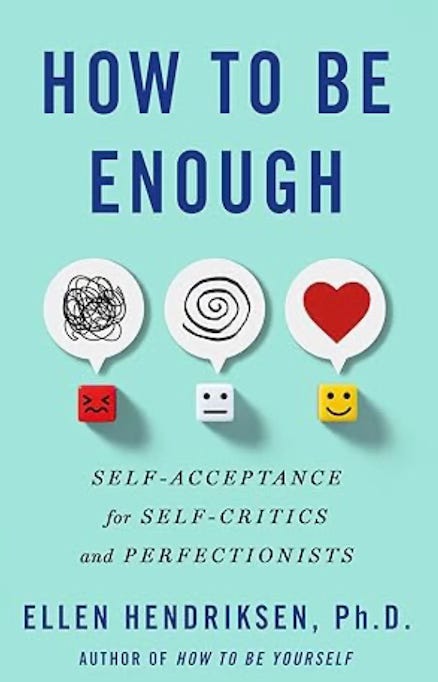Reviews aren’t just stars or words—they’re a signal to future readers. If How to Be Enough helped you feel seen, understood, or equipped, please write an honest review wherever you hang out online. I’m aiming for 30 more reviews on Amazon!
Hello everyone!
A dear reader named Jewel, who is a friendship coach working towards her LCSW, wrote in and noted, “learning about social anxiety, especially from a perfectionist perspective, has been instrumental in my work!” (To which I say, “whoo-hoo!”)
More importantly, Jewel asks: “What exercises or questions are helpful for building more self-acceptance around our ‘fatal flaws’”?
I love this question. And I have three answers!
But first, some orientation.
Here’s a quick primer on social anxiety and perfectionism, and why self-acceptance matters in that context.
Social anxiety and perfectionism are siblings. They’re both based on a flawed perception of self, and we think we have to work very hard to avoid finding ourselves in a situation that would reveal our inadequacies to others.
In both social anxiety and perfectionism:
We think there’s a fatal flaw we need to hide or an inadequacy we need to compensate for to ensure acceptance (or at least avoid judgment and rejection).
We’re allergic to making mistakes.
We use avoidance to cope.
We think we have to perform as superbly as possible for people to like us.
An antidote for all these things? As Jewel alluded to, pumping up our self-acceptance will help us stop avoiding and engage in the world in the ways we want.
Next, let’s define self-acceptance.
True self-acceptance is recognizing who you are—your personality traits, physical body, emotional tendencies, and personal history that make you—you. It’s understanding and honoring your strengths and weaknesses without turning to self-judgment or self-criticism.
Acceptance doesn’t necessarily mean approval. You can accept, for example, that you (okay, fine, I…) tend to procrastinate without approving of that tendency.
Acceptance also means embracing all parts of yourself without having to qualify, compensate, or hype up your strengths. We don’t have to think, for example, “I know I tend to get defensive, but at least I’m funny!”
Finally, two things can be true at once: you can accept who you are and want to change. It’s totally legitimate to recognize your tendency to run late, and actively work to be on time more often.
How can those of us familiar with social anxiety and perfectionism grow our self-acceptance? Here are three truths to help you along your journey:
Truth #1: Know thyself.
Recognize and accept the predictable patterns of your thoughts, feelings, and reactions, AKA “This is what my brain does,” “This is how I’m wired,” or “This is who I am.”
What are the greatest hits of your brain? Which way does your personality tend to lean? Which of your emotional reactions can you forecast with the accuracy of the atomic clock?
In How to Be Enough, I write about my Inner Critic coming on strong after I do anything involving a microphone: a podcast, a talk, a video. The script goes like this: 1) talk to any kind of audience, 2) turn off microphone, 3) question myself with “Why did I say it that way?” “I revealed too much.” “I didn’t reveal enough.”
Thankfully, I’ve ridden this roller coaster enough times that I know it’s just what my brain does. And knowing that my Inner Critic’s yapping is an automatic reaction helps me take it less seriously. After all, a familiar noise is easier to tune out.
You can do the same with any consistent thought, reaction, or emotion.
For example, a client we’ll call Ted came in upset with himself for spiraling over a simple misunderstanding. He judged himself harshly, calling himself a drama queen, extra, mercurial. Holding his head in his hands in shame, he gave example after example from his life where he felt he overreacted to life’s inevitable blips and bloops.
He worked to compassionately but accurately label his tendency to have strong reactions. He settled on “I go big.” Now, when Ted has big feelings, whether negative or positive, he reminds himself, “Oh, this is just how I’m wired. It’s part of my personality to go big.”
Does Ted want to work on being more even-keeled? For sure. But he can simultaneously recognize and understand his natural wiring, and therefore reduce the shame.
Now it’s your turn. How does your brain work?
"I need time to warm up in new groups. Knowing that helps me be patient with myself.”
"I get irritable when I’m anxious. Recognizing that helps me catch it sooner.”
“I always replay conversations on a loop after a party. It’s just what my brain does, and when it starts, I know it’s time for me to focus on something else.”
Truth #2: Make room for mistakes.
Don’t lower your high standards! But do expect and allow a certain number of inevitable mistakes, flaws, rejections, and random flailings.
Self-acceptance is all about reducing self-judgment.
Self-judgment comes from thinking we should be different, better, or are otherwise doing it wrong.
Therefore, if we build in permission for mistakes, flaws, rejections, and unmet potential, we reduce our self-judgment.
For example, a young client we’ll call Melissa was rejected from a job. She knew intellectually that not every application leads to an offer, but emotionally, it felt like a rejection of her as a person.
Since then, she’s worked to reframe rejection as proof that she is aiming high. Getting an offer from everything she applies for, she’s decided, means she could have aimed higher. By making room for rejection and folding it into her idea of herself as a high achiever, Melissa turned disappointment into a badge of honor.
Reframing mistakes and rejection is one way to make room, but *big flashing lights*: at the same time, we don’t have to “learn from” or “reframe’ anything at all to increase our tolerance for mistakes. Sometimes things just don’t go well. A certain percentage of things we try will flop. A few of our natural tendencies will be unflattering. Everyone has experiences that suck harder than a straw in a thick milkshake.
And guess what? Rather than setting us apart and indicting us as failures, our shortcomings, disappointments, and challenges bind us together with every other person on the planet. They stamp our ticket into The Human Club. And wouldn’t we rather be together with everyone else than alone and lonely on No Mistakes Island?
Truth #3: Tell someone you trust.
Sometimes self-acceptance starts with someone else’s acceptance.
Even though it has the word “self” in it, self-acceptance doesn’t only have to come from you. Just like many people don’t realize they’re lovable until someone loves them, and others don’t realize they have a voice until someone actually listens, self-acceptance can grow when someone else finds you acceptable—”fatal flaws” and all.
But we’ll never get the chance to learn we’re acceptable to others if we go through life hiding our perceived imperfections.
Therefore, try a technique from Dialectical Behavior Therapy called opposite action. As the name implies, opposite action encourages us to do the exact opposite of what our negative emotions are telling us to do.
You’ve probably already done this for anxiety by doing the very things you’re afraid of—raising your hand in class, giving that wedding toast, or picking up the phone rather than letting it go to voicemail.
Shame—from making mistakes, screwing up, or having oh-so-human imperfections—tells us to hide, isolate, or conceal. Therefore, taking the opposite action to shame is telling someone you trust.
Tell a non-judgmental friend that you’re worried ending things with your ex was a mistake, that, in a fit of insecurity, you asked ChatGPT “Am I annoying?”, or that you get jealous of friends’ successes when you know you’re supposed to be happy for them.
Is an open, understanding response guaranteed? Regrettably, no. But choose someone you trust. Consider prepping them: “Can I tell you something?” Often, revealing something we’re a little (or a lot) ashamed of leads to support, validation, and yes, acceptance.
To review, get to know your predictable brain patterns, make room for mistakes without lowering your standards, and dare to let people you trust see behind the curtain. Every small act of self-acceptance chips away at shame and strengthens your sense of yourself, “fatal flaws” and all.
Be kind to others and yourself!
Did you find this note from me useful? If so, please share it with one person you care about. Even in our digital world, a word of mouth recommendation is still the most valuable!













Beyond excited about this and so so honored! As always, these 3 things were so helpful and entertaining to read. I especially loved #2 where you talked about how every mistake/rejection doesn't need a reframe! Thank you for this, Dr. H! :)